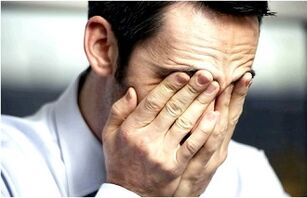
Prostatitis is an extremely unpleasant disease.
And especially given how important it is for any man to feel leadership and superiority in everything, the problems of sex life can have a very negative impact on mental health, self-confidence and the will to win in general. Therefore, it is very important to detect, cure and even better prevent prostate inflammation in time. Treating prostatitis in men is most effective, but it doesn’t always help. Moreover, this is important without exception for all men who have reached the age of 30-35, as this is when they belong to the risk group for this disease. However, the disease can manifest itself in different forms, with different manifestations - so it is very important for prevention to see a doctor regularly.
But first you need to find out what this disease is. To do this, it is worth turning to the knowledge of medicine and anatomy. The word "prostatitis" is of Latin origin - prostatitis. Literally, the prostate (which got its name from this word) is the prostate gland, and it’s inflammation. That is, prostatitis occurs as a result of infection of the prostate. This often happens because this gland is located in a place where bacteria from the intestines, bladder, blood, or lymph can easily penetrate it. And it happens quite often, but in most cases, a man’s body successfully copes with it. Additional factors are needed for prostatitis to occur.
Causes of prostatitis
The causes of this disease can be different, with many factors and shades leading to inflammation of the prostate. However, there is a cause for this disease. These are pathogenic microbes that penetrate the prostate, begin an active life, corrode and destroy tissues from within - and thus cause an inflammatory process.
However, depending on the nature of the disease and its manifestation, inflammation can occur in different ways. In some cases, it develops rapidly and is accompanied by acute pain, and sometimes the infection gradually destroys the tissues, initiating a process of disease that can continue even if the infection itself disappears.
The infection itself enters the prostate along the ascending path. Most often - through the urethra, especially in diseases of the urogenital system. In some cases, through blood and lymph, from infected pelvic organs. Thus, the prostate becomes infected.
Several factors can affect the development of inflammation:
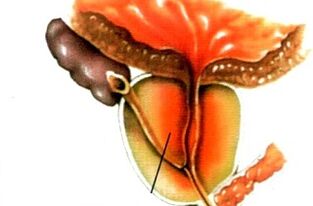
- Infectious diseases of the urogenital system.
- Sexually transmitted diseases and sexually transmitted infections.
- Excessive hypothermia, especially during the winter season.
- Decreased in the body's defenses when the immune system is unable to cope with the infection.
- Congestion and a significant violation of the pelvic circulatory system, which occurs mainly in the absence of sedentary work and adequate physical activity.
- Irregular sex and long-term abstinence (because the prostate is naturally massaged during ejaculation).
- Excessive sex often causes inflammation in the prostate as well.
- Damage to the genitals or perineum. Motorcyclists and cyclists, as well as motorists, suffer the most from such injuries.
- Alcohol and smoking abuse. Such bad habits cause severe disturbances in the functioning of the body as a whole and lead to edema in the prostate gland in particular.
- An unbalanced and unhealthy diet can also cause prostatitis, as a lack of vitamins and minerals can damage the immune system.
- Psychological and physical overload that causes stress in the body.
- Allergic reactions.
- Hormonal disorders.
- Stool problems (regular and frequent constipation).
However, the above factors do not mean at all that if a male driver who likes to ski in the winter or an office worker who spends his entire working day in a sitting position, he certainly has inflammation of the prostate gland. This just means that in addition to such risk factors, you will have to undergo regular tests to help identify the onset of the inflammatory process. It is advisable to do this at least every six months, as prevention will be much cheaper and safer than full and long-term treatment.
Types of prostatitis
Doctors identify many forms of prostatitis.
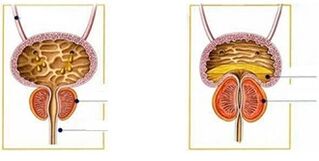
- Chronic Bacteria- Inflammation of the prostate that occurs in chronic form, usually caused by a long-lasting bacterial infection. This form of prostatitis is diagnosed when the appropriate bacteria are found in a sample of prostate secretion.
- Chronic Abacterial Prostatitis- Chronic inflammation of the prostate that is not infectious, meaning no bacteria are detected during the test. The development of this type of prostatitis is primarily due to autoimmune damage to the tissues of the prostate.
- Acute prostatitisis a special form characterized by chronic pain. They are mainly localized in the genitals. These pains are the main and main symptoms of prostatitis.
- Asymptomatic- This is the most unpleasant form that is difficult to diagnose and progresses without symptoms. It can only be determined during regular preventive examinations.
Symptoms
The very first and obvious symptom that can indicate the occurrence of inflammation of the prostate gland is difficulty urinating and painful feelings in these moments. If you have such feelings, be sure to see a doctor and check for infection. The same is true if the urination stimulus becomes too frequent and the bladder is emptied in small doses.
It is especially important to pay attention to all changes and unusual feelings in the body, given the fact that often inflammatory processes begin to progress completely asymptomatically and gradually become a chronic form. And such a disease is much more difficult to treat because prostatitis itself can continue to develop even after the infection has been removed.
Acute prostatitis is much easier to detect. Because in this case it manifests itself sharply and suddenly. But it’s worth remembering that each person’s disease can progress in completely different ways, each very unique.
Symptoms of acute prostatitis, the main symptoms of prostatitis:
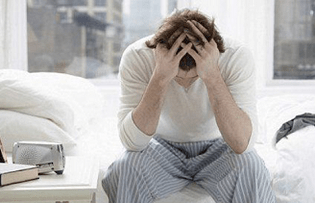
- Painful feelings when urinating.
- Frequent urge to empty the bladder.
- Painful feelings in the perineal region. And not only in the genitals, but also in the anus and sacrum.
- Potential disorders.
- If bowel movements are accompanied by painful sensations.
- Weak body condition and malaise.
- Temperature rise.
- Increased unexplained sweating.
- Constant feeling of full bladder.
- Simultaneous secretion from the urethra occurs during bowel movement.
- Unstable emotional state, irritability.
It is not at all necessary for a person to show all the symptoms at once, as each organism is unique. Therefore, the manifestations may be completely different. One of the most urgent symptoms to check for an inflammatory process is a violation of potency. This can be a problem with both erection and premature ejaculation, and in some cases - in principle, a lack of sexual desire. But you don’t have to worry about it - as soon as the underlying disease is cured, all of these problems go away on their own.
Diagnostics
You should consult a urologist to make an accurate diagnosis and determine the presence of the disease. Because you can’t do this alone, and if you start the inflammatory process, it can cause serious complications.
The approximate algorithm used for diagnostics is as follows:
- A medical examination that performs a comprehensive clinical evaluation of the condition.
- Urine test (general analysis of the microflora is usually performed).
- A study to identify sexually transmitted diseases.
- Determining the presence or absence of infection using a urethral swab.
- Ejaculate analysis.
- Ultrasound examination of pelvic organs.
- Urography.
- In some cases, a biopsy if prostate cancer is suspected.
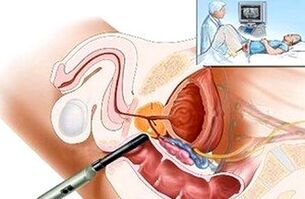
After all of the above tests, a "trial" treatment of the infection is performed if inflammation is found. And already based on all this data, the doctor is working out an additional treatment regimen for prostatitis.
The question often arises as to whether chronic prostatitis is curable. The doctors' comments on this issue are very reassuring, very suitable for treatment.
Management
The disease itself is very severe and causes great difficulty in treating doctors. However, this does not mean at all that the doctor cannot do anything. The disease is completely curable and can relieve symptoms and help the patient very quickly. Medication for prostatitis in men can relieve discomfort very quickly. In addition, modern medicine is capable of many things, including creating a stable remission. The truth depends on the patient himself how the whole treatment will go. It is necessary to clearly and unequivocally follow all the recommendations prescribed by your doctor, otherwise you may not be able to achieve the desired result. But in order to guarantee recovery, it is very important to make sure that the doctor is professional, as the process itself, the treatment scheme for prostatitis, must be developed very competently, otherwise it will be difficult to achieve effectiveness.
The set of measures taken to treat prostatitis usually includes the following procedures:
Antibiotic therapy
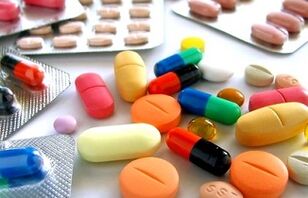
Because prostatitis is an inflammation caused by an infection of the prostate, its main treatment is to suppress it. Therefore, prostatitis is treated with antibiotics. It is difficult to highlight the best cure for prostatitis because everything is purely unique. Today, in order to cure chronic prostatitis, doctors are resorting to the use of drugs that belong to the macrolide group. Their main activity is to block the formation of proteins in bacteria, thereby interfering with the possibility of vital activity. Although in some cases other medications are used. Your doctor will select a medicine and use it to work out your treatment plan, taking into account your individual characteristics, so the dosage and choice of the medicine itself will not always be the same.
The antibiotics themselves take an average of about 2 weeks. But again, it all depends on the individual characteristics of each patient. After this time, a second full examination and research is usually performed to determine if it is necessary to stop treatment or change its schedule. An anti-inflammatory drug for men is one of the main ways inflammation of the prostate. However, it is not the only one.
Massage
Massage is a very effective tool for the prevention and treatment of prostatitis. Since one of the main causes of its occurrence is stagnation, massage makes it possible to eliminate them. By improving blood microcirculation in the genitals and draining prostate secretions, the condition improves and treatment is much more successful, healing is faster. Prostate massage can be performed independently and by a doctor. Methods include microcycles, testicular massage, direct effect on the prostate through the anus. But there are also some limitations. Because such a massage has a certain physical effect, it is not recommended to perform it if the prostatitis is acute, as well as hemorrhoids, cracks, and other diseases of the rectum. Massage is very often prescribed in addition to antibiotic therapy as it has repeatedly proven its effectiveness in treating this serious disease. The treatment of prostatitis with massage is very often included in a package of measures to get rid of this unpleasant disease.
In addition to massage, home treatment of prostatitis involves performing complex or individual gymnastic exercises that help normalize blood flow to the pelvic organs and thus promote rapid healing.
Physiotherapy
In addition, physiotherapy procedures are prescribed for the treatment of prostatitis, which are also able to effectively cope with the treatment of this disease. It helps to improve the trophism of tissues, the blood circulation of the prostate. One or the other device for the treatment of prostatitis is used in these procedures. Among the methods and measures of physiotherapy, we can highlight magnetic and laser therapy, electrophoresis, hot bath preparation, diadynophoresis and ultrasonic phonophoresis. In some cases, the use of mud baths is very effective. Another physiotherapy method for the treatment of prostatitis is the use of enemas of different compositions. For example, using mineral waters.
When using each prostate inflammation machine, remember to be very careful not to cause damage.
Herbal medicine
Usually used in addition to the main treatment. With the help of phytotherapy, men’s prostatitis is treated at home, but it can in no way replace the main intake of antibiotics. Taking herbal decoctions and dietary supplements helps the body strengthen the immune system, thereby increasing the body’s defenses and contributing to a successful fight against infections. Herbal medicines are used to treat chronic prostatitis with folk remedies. This type of therapy is a good adjunct to the main treatment, because thanks to the effect of some herbs it is possible to speed up the blood circulation in the pelvic organs and the whole body, to increase the resistance to infections.
Psychotherapy
Prostatitis is often psychosomatic in nature. And sometimes even the use of tablets in prostatitis does not work to achieve the desired effect. In addition, prostatitis very often causes severe disorders in a person’s sexual sphere, often leading to an unstable psycho-emotional state. The goal of psychotherapy is precisely to cope with these crisis moments and remain a full-fledged person. Men are very often extremely insecure about such health problems, which greatly affect all areas of life. It is very important to combine methods of treating prostatitis with competent psychological work with the patient. There are often cases where the treatment was much more effective after a man underwent psychotherapy and coped with a number of very difficult internal problems. Therefore, this type of therapy is no less important for a successful cure than others.
Surgery
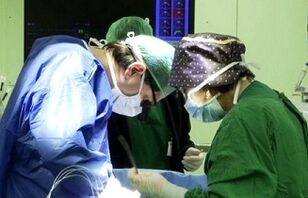
In particularly difficult and advanced cases, you may need to seek the help of a surgeon. Urethral stricture and prostate abscesses may occur. Sometimes it is necessary to excise the adenoma. All this happens if the diagnosis and proper treatment are not carried out in time. Then complications begin - and this kind of intervention is already needed. In severe cases, surgery may be needed to remove the prostate. In order to prevent such consequences, preventive measures should be taken regularly, and a doctor should be consulted every six months.
Immune correction
Because inflammation is due to the fact that the body was unable to cope with the infection on its own, the immune system needs to be strengthened to effectively treat inflammation in the prostate. In addition, if you have previously failed antibiotic treatment, your immune system is weakened and needs even more strengthening. In addition, such therapy has a very positive effect in preventing the recurrence of prostatitis after healing.
Treatment can simply include supplemental vitamins or minerals. The best way would be to contact an immunologist who will perform all the necessary tests and prescribe exactly what is missing from your body to work successfully and enhance your protective functions. Then medications to treat prostatitis will be most effective.
Nutrition
In addition to general therapy, especially when treating chronic prostatitis, some adjustments are made to the dosing regimen and diet. However, there are no general schemes, each with its own restrictions or additions. It depends on both the form of the disease and the human body.

But there are still a number of basic requirements that are mandatory. Moreover, it is advisable to monitor them as soon as prostatitis is suspected. These restrictions include, above all, the refusal of alcohol. Because it has a destructive effect on the body and can cause a sharp development of inflammation. So the use of salt in the daily diet should be limited. And ensure daily fluid intake in the body - at least 1, 5 liters.
In any case, the diet needs to be adapted to be based on fresh vegetables and fruits, and the other products are already next to them. If aggravation occurs, it is advisable to give up the fried food and steam everything. Protein foods - meat, fish and chicken, even during periods of inflammation, it is advisable to exclude them from the diet, gradually returning them as the condition improves.
There are also a number of products that have a detrimental effect on the prostate, so it is advisable, if not excluded, to at least significantly reduce use during treatment. These products are:
- Tea and coffee - due to their high caffeine content. Sometimes cocoa also belongs to this group.
- All canned food, smoked meat, salting and overly spicy or spicy foods should also be excluded.
- Any animal fat, including broths.
- Cabbage and all legumes can cause fermentation in the intestines, so they should be avoided as well.
- Bakery products, especially made from wheat flour - for the same reason.
Your doctor will also tell you exactly what needs to be changed in your diet.
Alternative treatment
Prostatitis can also be treated with folk remedies, which are also quite effective. But at the same time, it is essential that you consult your doctor in advance and start such treatment only with his or her consent. There are a lot of folk recipes - it can be the creation of unique products, such as propolis or pumpkin seeds, or special products, tinctures, candles.
Folk remedies for prostatitis can be very effective supplements for the treatment of prostatitis. But by no means should you self-heal.
Prevention

The main preventive measure of any disease is to pay attention to your own health. To prevent the inflammation of the prostate from developing, you simply need to try to avoid the factors that can cause it to occur. Namely, don’t overcool yourself, monitor your diet and lifestyle, exercise regularly, and prevent the occurrence of sexually transmitted infections. And have regular sex with your regular partner, treat infections immediately, especially the pelvic organs.
But the best preventative measure is still a regular visit to the doctor. Because prostatitis often happens to be completely asymptomatic, and if not diagnosed in time, it will be much more difficult to cure in the future. Therefore, you should not forget about this measure and you should see a doctor at least every six months.
























